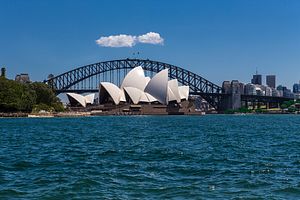Chinese and Indians may be feeling richer after recent World Bank wealth upgrades, but Australians remain some of the happiest people on the planet.
In the OECD’s latest Better Life Index, the Paris-based economic organization rated Australia the happiest industrialized nation for the fourth consecutive year, outpacing Norway and Sweden in the positivity stakes among the 36-member group.
The “Lucky Country” ranked above average in all but one of the 11 life categories, coming top in civic engagement and above average in environmental quality, health status, housing, personal security, jobs and earnings, education and skills, subjective well-being, social connections, and income and wealth.
However, the supposedly laid-back Aussies ranked in the bottom 20 percent for work-life balance, while the percentage satisfied with their lives remained virtually static over the period from 2007 to 2012, at 77 percent.
The OECD said more than 3.6 million people in 184 countries had used its wellbeing barometer to assess their quality of life, with some interesting findings.
“Japanese users of the Better Life Index (BLI) worry most about safety, Australians seek work-life balance, Latin Americans strive for better education, and Danes want to be happy,” the OECD said in a statement.
Japan’s concerns for safety came despite the nation’s top ranking for personal security, with other worries including life satisfaction and education. The nation also ranked above average in income and wealth, education and skills, jobs and earnings and social connections, but below average in the six other categories.
Similar to their neighbor, Korean users rated safety and life satisfaction in addition to health as their key topics of interest. The nation ranked above average in five categories including civic engagement, jobs and security, but below average in income and wealth along with the environment.
New Zealanders shared their neighbor Australia’s concerns with life satisfaction, health and work-life balance, although the nation ranked above average in every category except work-life balance and income and wealth.
At the bottom of the rankings were Greece, Mexico and Turkey, although all three countries had reasons to be happy, including Greeks’ above-average health and Mexicans’ high level of life satisfaction.
Despite their apparent optimism the Australians have shown a less than positive response to news of a tough federal budget on May 13. Amid reports of potential tax hikes and welfare cuts, the Abbott government has seen its poll ratings plunge in the largest single fall since former leader Julia Gillard announced plans for a carbon tax.
“No one likes difficult decisions – governments don’t like taking difficult decisions, voters don’t like the consequences of difficult decisions – but you’ve just got to make hard decisions at a time like this, otherwise our country is doomed to years of economic stagnation,” Abbott told the Nine Network.
China, India Show Mixed Reaction to PPP
While China and India were not included in the OECD’s happiness report, the two nations have shown differing responses to news of their economic upgrading by the World Bank.
Based on purchasing power parities (PPP), the World Bank’s International Comparison Program said China could overtake the United States this year as the world’s biggest economy, but Beijing was less than excited by the news.
According to the World Bank, China’s National Bureau of Statistics “expressed reservations” about the study’s methodology and “did not agree to publish the headline results for China.”
Beijing has previously been reluctant to comment on such economic milestones, “possibly to avert pressure to take on financial obligations or make concessions on trade or climate change,” The Washington Post speculated.
While China is forecast to overtake the United States in PPP terms, it would still be only 60 percent the size of the US economy at market exchange rates. China’s per capita gross domestic product was estimated at $9,800 in 2013, well below the U.S. level of $52,800 or Japan’s $37,100, currently the world’s largest and third-largest economies in nominal terms.
By contrast, The Diplomat has noted India’s joy at its supplanting of Japan as the world’s third-largest economy in PPP terms.
“The World Bank’s report has been widely featured in the Indian media and is a morale-improving piece of news for a country that has been besieged by high inflation, stagnant growth, corruption, and other economic ills in the past year,” Ankit Panda wrote.
In nominal terms, the International Monetary Fund ranks India’s economy 12th largest, only a third of Japan’s size.
Other analysts have cautioned against overplaying the World Bank’s report, with ANZ economist Justin Fabo telling The Diplomat that “it’s market exchange rates that matter…and on that basis China is still much smaller than the U.S.”
Carnegie Council Senior Fellow, Devin Stewart told The Diplomat that the World Bank’s report would be “lost on most Americans given its technical character and given many Americans assumed China was number one already.”
He added: “Moreover, the PPP measure of GDP measures raw output but not the areas that really matter for international comparisons – economic power, wealth, and market size. Rather it takes into account the relative prices of non-tradable things like hair cuts or meals at a restaurant. But I doubt any Chinese person derives as much satisfaction from a dinner in Shanghai as he or she would in New York City, where the food standards are higher and air and water are relatively clean. So even as a measure of wellbeing, it’s problematic.
“I lived in Tokyo when China surpassed Japan in PPP terms of GDP but it wasn’t until it passed in nominal terms in 2010 that it caught the public’s attention. That India is now bigger than Japan in PPP terms will only matter to policy wonks. PPP is better for comparisons between countries in similar stages of development.”
While the debate over methodology will likely continue, the Aussies can also celebrate the prospect of expanding markets for the nation’s exports of resources and agricultural products. And with China and India reportedly getting richer, that might be worth smiling about.

































